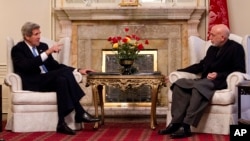KABUL —
U.S. Secretary of State John Kerry is in Afghanistan for talks with President Hamid Karzai on security cooperation and preparations for next year's elections. The unannounced visit follows agreement on the transfer of the last Afghan prisoners held by U.S. forces.
This is John Kerry's sixth trip to Kabul since President Obama took office, and U.S. officials say they are counting on his personal history with President Karzai to overcome some of the obstacles in this often-contentious relationship.
Most recently, President Karzai said U.S. forces and Taliban fighters were colluding to destabilize Afghanistan.
Senior State Department officials traveling with Secretary Kerry say he is not here to "lecture or chide" Karzai and is working instead to "move beyond this incident," in part, by resolving some of the irritants Washington believes contributed to the president's outburst.
There is agreement on a gradual withdrawal of U.S. special forces from Wardak province, something U.S. officials say is a positive sign of how Washington and Kabul are resolving issues in the interest of Afghan sovereignty.
There is also agreement on the transfer of the last prisoners held by U.S. soldiers in Afghanistan, with U.S. officials saying they believe that "detainees of most concern" will be held securely, humanely, and in accordance with Afghan law.
As a senator, John Kerry was directly involved with Afghanistan's 2009 vote. So as secretary of state he is looking to engage President Karzai in talks on 2014 elections as the international security force here prepares to wind down by December of next year.
On Afghan reconciliation, U.S. officials say they continue to support the Taliban opening an office in Doha, Qatar, and join President Karzai in calling on the Taliban to join the peace process, so long as they break with al-Qaida, lay down their weapons, and embrace Afghan constitutional protections for women and minorities.
Secretary Kerry wanted to go to Pakistan on this trip as well, but decided against it because of the ongoing political transition there.
Instead he met in Jordan late Sunday with Pakistani military chief General Ashfaq Kayani on a range of bilateral security issues, including counter terrorism and combating safe havens along the Afghan border.
This is John Kerry's sixth trip to Kabul since President Obama took office, and U.S. officials say they are counting on his personal history with President Karzai to overcome some of the obstacles in this often-contentious relationship.
Most recently, President Karzai said U.S. forces and Taliban fighters were colluding to destabilize Afghanistan.
Senior State Department officials traveling with Secretary Kerry say he is not here to "lecture or chide" Karzai and is working instead to "move beyond this incident," in part, by resolving some of the irritants Washington believes contributed to the president's outburst.
There is agreement on a gradual withdrawal of U.S. special forces from Wardak province, something U.S. officials say is a positive sign of how Washington and Kabul are resolving issues in the interest of Afghan sovereignty.
There is also agreement on the transfer of the last prisoners held by U.S. soldiers in Afghanistan, with U.S. officials saying they believe that "detainees of most concern" will be held securely, humanely, and in accordance with Afghan law.
As a senator, John Kerry was directly involved with Afghanistan's 2009 vote. So as secretary of state he is looking to engage President Karzai in talks on 2014 elections as the international security force here prepares to wind down by December of next year.
On Afghan reconciliation, U.S. officials say they continue to support the Taliban opening an office in Doha, Qatar, and join President Karzai in calling on the Taliban to join the peace process, so long as they break with al-Qaida, lay down their weapons, and embrace Afghan constitutional protections for women and minorities.
Secretary Kerry wanted to go to Pakistan on this trip as well, but decided against it because of the ongoing political transition there.
Instead he met in Jordan late Sunday with Pakistani military chief General Ashfaq Kayani on a range of bilateral security issues, including counter terrorism and combating safe havens along the Afghan border.





